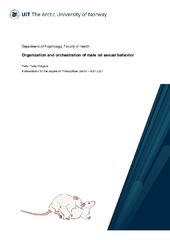Blar i forfatter "Huijgens, Patty Thalia"
-
Assessment of sexual behavior in rats: the potentials and pitfalls
Heijkoop, Roy; Huijgens, Patty Thalia; Snoeren, Eelke (Journal article; Tidsskriftartikkel; Peer reviewed, 2017-10-27)In the field of behavioral neuroscience, it is essential to use the appropriate animal models for the topic of investigation. Using the wrong model can result in false interpretation of the results. In this review we will discuss the animal models used to study sexual behavior, with a focus on rats. We will discuss the potentials and pitfalls of the different paradigms and try to make recommendations ... -
CaMKIIa+ neurons in the bed nucleus of the stria terminalis modulate pace of natural reward seeking depending on internal state
Huijgens, Patty Thalia; Heijkoop, Roy; Vanderschuren, Louk; Lesscher, Heidi; Snoeren, Eelke Mirthe Simone (Journal article; Tidsskriftartikkel; Peer reviewed, 2024-02-24)This study aims to investigate the underlying neurobiological mechanisms that regulate natural reward seeking behaviors, specifically in the context of sexual behavior and sucrose self-administration. The role of CaMKIIa+neurons in the bed nucleus of the stria terminalis (BNST) was explored using chemogenetic silencing and -stimulation. Additionally, the study examined how these effects ... -
Effects of gonadectomy and dihydrotestosterone on neuronal plasticity in motivation and reward related brain regions in the male rat
Huijgens, Patty Thalia; Snoeren, Eelke; Meisel, Robert; Mermelstein, Paul (Journal article; Tidsskriftartikkel; Peer reviewed, 2020-11-06)Gonadal hormones affect neuronal morphology to ultimately regulate behaviour. In female rats, oestradiol mediates spine plasticity in hypothalamic and limbic brain structures, contributing to long‐lasting effects on motivated behaviour. Parallel effects of androgens in male rats have not been extensively studied. Here, we investigated the effect of both castration and androgen replacement on spine ... -
Female rat sexual behavior is unaffected by perinatal fluoxetine exposure
Hegstad, Jan; Huijgens, Patty Thalia; Houwing, Danielle; Olivier, Jocelien; Heijkoop, Roy; Snoeren, Eelke (Journal article; Tidsskriftartikkel; Peer reviewed, 2020-07-22)Serotonin plays an important role in adult female sexual behavior, however little is known about the influence of serotonin during early development on sexual functioning in adulthood. During early development, serotonin acts as neurotrophic factor, while it functions as a modulatory neurotransmitter in adulthood. The occurrence of serotonin release, could thus have different effects on behavioral ... -
Male rat sexual behavior: Insights from inter-copulatory intervals
Huijgens, Patty Thalia; Guarraci, Fay; Olivier, Jocelien; Snoeren, Eelke (Journal article; Tidsskriftartikkel; Peer reviewed, 2021-07-09)The assessment of sexual behavior in male rats with the aim of unraveling underlying neurobiological mechanisms has in the recent decades been reduced to the annotation of mounts, intromissions and ejaculations. To provide a better understanding of the structure and patterns of copulation, it is necessary to extend and tailor the analysis to the natural organization of male rat copulation. This will ... -
Organization and orchestration of male rat sexual behavior
Huijgens, Patty Thalia (Doctoral thesis; Doktorgradsavhandling, 2021-09-07)Sexual behavior is innately motivated and rewarding. The underlying neurobiological mechanisms of sexual motivation, copulation, and sexual reward have not been completely unraveled. This thesis gives insight in the structure, organization, and neurobiological orchestration of male rat sexual behavior. The research presented in this thesis demonstrates that a more extensive behavioral annotation ... -
Silencing and stimulating the medial amygdala impairs ejaculation but not sexual incentive motivation in male rats
Huijgens, Patty Thalia; Heijkoop, Roy; Snoeren, Eelke (Journal article; Tidsskriftartikkel; Peer reviewed, 2021-02-24)The medial amygdala (MeA) is a sexually dimorphic brain region that integrates sensory information and hormonal signaling, and is involved in the regulation of social behaviors. Lesion studies have shown a role for the MeA in copulation, most prominently in the promotion of ejaculation. The role of the MeA in sexual motivation, but also in temporal patterning of copulation, has not been extensively ...


 English
English norsk
norsk





